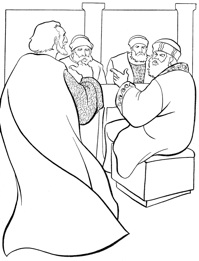Bible Stories for Young Adults



The Bloody Sign

Moses was the man God used to deliver the Hebrew slaves from Egyptian
bondage. He was the man who led them through on dry land through the Red
Sea. He was the one through whom God gave the ten commandments. But did you know that before Moses did all this that the Lord was about to kill him?
At the age of forty, Moses fled from Egypt after he had killed an Egyptian
there for physically abusing a Hebrew slave. He had gone to the land of Midian where he joined to the family of Jethro, a priest, who had seven daughters. He
married one of the daughters whose name was Zipporah and she gave birth to
two sons, Gershom and Eliezer.
After Moses was called by God at the scene of the burning bush to go back to
Egypt to appear before Pharoah to seek release for the Hebrew slaves, he
obtained permission from Jethro to take this trip and to take his wife and
sons with him.
However, on the way, as they were staying in an inn, the Lord was about to
kill Moses because he had not had his son circumcised. (This was presumably
his younger son.) So Zipporah did what no mother would really want to have
to do. She took a flint knife and circumcised her son because Moses may
have been too sick to perform the surgery himself. She threw the foreskin
from her son's circumcision at Moses feet and exclaimed, "Surely you are a
bloody husband to me!" The Lord did not seek to kill him after the son was
circumcised.
What is circumcision? It is the cutting off of the foreskin of the male
penis. Why was this such a big deal? About 500 years before the time of
Moses, the Lord had appeared to a man named Abraham and made a covenant with him. After the Flood of Noah, the Lord picked out from all the people on earth the man Abraham to become the father of the faithful. Abraham's descendants would become a great nation through whom the Messiah, Jesus Christ, would one day (about 2000 years later) be born. God told Abraham that the sign of the covenant with this nation would be that every male among them must be circumcised, and newborn males who were descendants of Abraham, or sons of Abraham’s servants, would be circumcised when they were eight days old. (Genesis, chapter 17) Additionally, any alien male who joined the faith of Abraham would also be circumcised.
Why circumcision? Such a bloody and painful operation! Since nakedness is
a shame, it is a sign that would not be seen by others. Why circumcision?
This was something the women could not be a part of -- only the men. Why
circumcision?
Though God's Word does not give specific reasons for this sign, some of the
reasons may be as follows.
First, it was a symbol of cleanliness. Since the sin nature of people is
passed down through the male, not the female, cutting off the foreskin of
the male reproductive organ could be a sign of God's redeeming His people
from the curse and uncleanness of sin. (One evidence that the sin nature
is passed through the male is that Jesus had to be born of a virgin in order
to not inherit a sin nature.)
Some claim that circumcised men have fewer diseases associated with this
organ and the organ is easier to clean when circumcised. Penile cancer is
extremely rare among circumcised males. According to S. I. McMillen, M.D.,
author of the book None of These Diseases, studies were done in 1954 that
gave firm evidence that women married to uncircumcised men were eight and
one-half times more likely to develop cancer of the cervix than Jewish
women, whose husbands were circumcised. Other studies showed similar
findings. Since that time hospitals in the United States routinely circumcise male infants, whereas male babies born at home during and before
the Great Depression were not generally circumcised.
However, hospitals do not wait until the eighth day after birth, as the Bible requires. The blood-clotting element, Vitamin K, is not adequate until the fifth to seventh day after birth. Prothrombin, another element that helps in the clotting of blood, is at its maximum level, even above the normal level, on the eighth day after birth, so the absolute safest time for a boy to be circumcised is when he is eight days old, just as God commanded Abraham about 4,000 years ago.
Second, circumcision was a way to keep Hebrew females within the Hebrew
family for marriage. (Genesis 34:14) Females growing up knowing that men
outside the Hebrew nation were "unclean" since they were uncircumcised would be preconditioned to not seek husbands elsewhere. This was important to the nation because intermarriage with other nations would have weakened them spiritually and morally. Though we have numerous cases of Hebrew men
marrying foreign women, often reaping unhappy endings, we are not told in the
Bible of Hebrew women marrying foreign men who had not been circumcised. (Perhaps one exception was Queen Esther, who had no choice in the matter.) Too, for a man outside of Israel to want to become a believer in the God of Abraham, he would have to submit to circumcision, which would definitely be a deterrent to hypocrites or half-hearted men. Until the time of Jesus' life on earth, the covenant people were strictly watched by God, and though they did
backslide at various times, the Lord would always discipline them and
"subtract" the most wayward individuals from the group, and give trials to
the others to bring them to their knees in repentance.
Thirdly, circumcision, a bloody covenant sign, would also foreshadow the
blood shed by Christ, but after Christ came, the bloody covenant sign was
replaced by water baptism. Circumcision is optional to a Christian.
Circumcision was practiced among the descendants of Abraham through their
time of slavery in Egypt. Once they left Egypt and were for forty years
wandering in the desert on the way to the Promised Land of Canaan, they
neglected circumcision. Perhaps this is because they no longer mingled with
people of other nations and did not need to practice this to set themselves
apart. However, upon entering Canaan, Joshua made all the males be
circumcised. (Joshua 5:2-7)
Though many Jews in the Old Testament trusted in their status of being
circumcised as the mark that made them right with God, many Old Testament
prophets warned them that God wants them to have a circumcised heart -- one
from which sin has been cut away and has been made clean and pure. (Jeremiah 4:4) Physical circumcision was to be an outward symbol of an inward heart reality.
Today, the same stands for baptism. One may be baptized in water but not
baptized with the Holy Spirit. Water baptism may be a symbol of becoming
clean, but if one is not repentant and made clean in heart and conduct, the
reality is missing and the symbol becomes vain.
Big fuss over circumcision
After Jesus rose from the dead, he stayed on the earth for 40 days before
ascending to heaven. During that time he taught his disciples to go into
all the world to teach the good news and to teach all the nations to obey
what he taught. He also told them to baptize their converts, but he did not
mention circumcision. Now, if Jesus had thought that all these
uncircumcised heathen in other nations needed to be circumcised, instead of
or in addition to being baptized into the Church, surely he would have
mentioned this in his great commission. (Matthew 28:18-20)
The first converts to Christ were Jews. They were already circumcised, so
no problem. But as Paul and others went out to win converts from other
nations, some Jewish Christians began insisting that these new converts be
circumcised. Now there were beginning to be big problems. In Galatia some
false teachers arrived and told those new churches that unless they were
circumcised they could not be saved. Paul got very angry that these
"Judaizers" were misleading the Galatians and making them believe that they
had to be circumcised. Paul rightly questioned whether they were trusting
in Christ and His grace alone, or whether they were coming in bondage to keeping all the commandments in the Old Testament laws. Paul even said, "I wish those Judaizers would just go on and castrate themselves," thus implying that circumcision did not go far enough for them. (Galatians 5:12)
Finally the feud got so steamed that Paul and his missionary companion
Barnabas went to Jerusalem to discuss the matter with Peter, whom Jesus
designated as "the rock," and James, the Lord's half-brother, and the other
elders and apostles of the early Church. Should all new uncircumcised
converts to Christ be circumcised? Should the church require this? The
zealous Jewish Christians from the party of the Pharisees said the new
converts should be circumcised and keep the laws of Moses. (Acts 15)
After a great deal of discussion, Peter boldly stated that he had
personally witnessed the transformation that uncircumcised Gentiles like
Cornelius had by the power of the Holy Spirit. Peter said that not even
Jews had been able to bear the yoke of the laws of Moses, and he stated that
both Gentiles and Jews are purified in their hearts by faith through the
grace of Jesus Christ.
Paul and Barnabas went on to tell the assembled leaders how God had been
doing marvelous works among the Gentiles they had preached to. After this,
James spoke up and quoted an Old Testament prophet who had foretold of the
day when the Gentiles would turn to seek the Lord. He said, "We should not
make it difficult for Gentiles who are turning to God."
However, James did state that there should be some preliminary requirements
for every Gentile joining the Church. First, they should not offend Jews by
eating food that had been sacrificed to idols and "non-Kosher" meat that was
from strangled animals. Neither should they consume blood, which was a
heathenish practice. This provision, of course, was so as to not entirely
gross out Jewish believers who ate with them, as well as to protect them
from becoming entangled with idol worship. The second restriction for new
Christians was that they should abstain from fornication.
Imagine that! Only two big deals! To distance yourself from idolatry by
observing some food rules and to forsake sex sins! As for the other rules
for living a godly life, they would hear about that as the Word of God would
be taught as they assembled weekly for worship.
So it appears that the number one mark of a Christian, as far as these
apostles was concerned, was that he or she is not flirting around with idol
worship and has forsaken sex sin! What kind of spiritual plane does that
put many church members of today on? How many church members show up week after week, listening to sermons and partaking of communion, yet have not come to God in sorrow and repentance over sex sins?
Keep in mind how important circumcision was in the Old Testament, but now
these pillars of the early Christian church are saying that it is more
important to be sexually pure than to be circumcised! In the New Testament
church sexual purity trumps circumcision. This is quite a huge statement!
As a reminder to the church that there is hope for us and for our nation,
look at Second Chronicles 7:14. "If my people, which are called by my name,
will humble themselves and pray and seek my face and turn from their wicked
ways (which definitely includes sex sins), then will I hear from heaven and
will forgive their sin and will heal their land."
Discussion
1. Put yourself in Zipporah's place and think of reasons why she may have
been upset about having to circumcise her son.
2. What is the strongest reason for circumcision in the Old Testament? Why
do you think God chose this as a sign of the covenant?
3. God was going to kill Moses for not having his son circumcised, but he
did not kill the people in the wilderness under Moses' leadership for not
circumcising their children? Why the difference?
4. What does it mean to have a circumcised heart?
5. What is the relationship between circumcision and baptism?
6. Some Muslims practice female "circumcision." What could be the reason
for this? Is it Biblical?
-
7. What were some problems that arose in the New Testament Church
regarding circumcision?
8. When the apostles and elders met in Jerusalem to settle the matter about
circumcision, what was the result?
9. Why do you think that James said that new converts must abstain from
fornication, rather than to stop lying or stealing, as being of utmost
importance?
10. What can the church do to cause God to heal our land?
Dig deeper
1. Read Exodus 4:18-26 and Exodus, all of Chapter 18. How would you
describe the relationship Moses had with his father-in-law? From these
passages why might you think that Moses' wife and sons returned to their
home in Midian after the circumcision incident? What risks are there to a prophet's family when a prophet speaks for God? How does Jethro's suggestion compare to the levels of government we have in the U.S.?
(Some commentators mention that since Zipporah was a Midianite, she despised the circumcision, but others note that Midian was a son of Abraham by Keturah, his wife after Sarah died. However, the Midianites may have
neglected circumcision and become ones "cut off" from the people of God,
which possibility is mentioned in Genesis 17:14)
2. Read Genesis, chapter 17. What did God command Abraham in verse 1?
What promises did God made to Abraham in verse 3-8? What was the sign of
the covenant in verses 9-14? After God told Abraham that Sarah would have a
son in verses 15-16, how did Abraham react? How did the promises that God
gave Abraham about Isaac differ from those He gave him about Ishmael? How
old were Abraham and Ishmael when they were circumcised?
3. Read Joshua, chapter 5. What was the difference between the Israelite
men who left Egypt and the ones who were born on the way? Men of military
age in Israel were age 20 and above. What happened to all the men who were
of military age when they left Egypt, and why? What do you think verse 9
means in speaking of "reproach"? What did the Israelites celebrate after
the men were healed? What encounter did Joshua have in verses 13-15? What great victory awaited them in Chapter 6?
4. According to Exodus 12:48, who was allowed to celebrate the Passover?
5. How are the uncircumcised viewed in each of the following passages?
Judges 14:3, I Samuel 14:6, I Samuel 17:26 & 36, I Samuel 31:4
6. What kind of circumcision does God want? Deut. 10:16, Jeremiah 4:4
7. What kinds of complaints about circumcision was Paul making in Galatians
5: 2-6 & 6:15. How strongly did he oppose the false apostles of the
circumcision party, and what did he say about them? (See Galatians 5:7-12,
8. To settle matters about circumcision in the New Testament era, the
Jerusalem Council was called after this in about 50 A.D. Read about this in
Acts, Chapter 15. Why do you think this council had even more authority
than Paul's letter to the Galatians?
9. After the Jerusalem Council, Paul could even more confidently write about circumcision in later letters. What did he say in the following
passages? Colossians 3:11, Romans 2:26-29, Romans 3:30, Romans 4:11,
I Corinthians 7:19, Philippians 3:3
10. Though circumcision was dismissed as a necessary prerequisite in
joining the Christian Church, what were major concerns of the apostles in
the early church? In what ways did Paul address the matters concerning sex
in I Corinthians 6:12-7:9 ? Concerning food and idols in I Corinthians 8:1-13, and 10: 6-8 & 14-33? What is God's will for all believers in Christ?
See the appendix of this website for a full Biblical definition of “fornication” and “virgin”.
Memorize: The Lord your God will circumcise your heart and the hearts of your descendants, to love the Lord your God with all your heart and with all your soul, so that you may live. Deuteronomy 30:6


Many people know much about Moses. He was the baby that the princess of Egypt found floating in a basket on the Nile. He was the one God used to deliver Israel from slavery in Egypt. He was the one through whom God gave the ten commandments. But what about the story depicted on the left? Why is Moses’ wife so upset? Read on to find out.


Moses is remembered for his delivering the Ten Commandments to the people of God. Was he forced to circumcise his son before or after this great event?
Abraham, who lived about 500 years before Moses, was the one through whom God gave the covenant sign of circumcision. Who was supposed to be circumcised?
Esther, a Jew, was taken into the harem of the King of Persia. The king made her his queen, but he did not
know she was a Jew. How did her situation of marriage to an uncircumcised man differ from other Jewish women?

Joshua is known for his leading the victory over Jericho as God caused the walls of the city to fall flat. Did he win this victory before or after he ordered that the males to be circumcised?

Instead of circumcision which was practiced among the faithful in the Old Testament, what is the rite of passage into the Christian church?

After Jesus ascended, the Jewish leaders of the Christian church met in Jerusalem to decide whether
non-Jewish converts to Christ had to be circumcised. What was their rather surprising stipulations that these converts must not do?

What does it mean to “humble” ourselves?
Is there a health advantage to males who are circumcised?
Try this link:
http://health.yahoo.net/news/s/nm/uncircumcised-boys-and-men-may-face-more-utis#.UML9gPIRdwg.facebook
